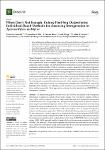When One’s Not Enough: Colony Pool-Seq Outperforms Individual-Based Methods for Assessing Introgression in Apis mellifera mellifera
| dc.contributor.author | Buswell, V | |
| dc.contributor.author | Ellis, J | |
| dc.contributor.author | Huml, J | |
| dc.contributor.author | Wragg, D | |
| dc.contributor.author | Barnett, M | |
| dc.contributor.author | Brown, A | |
| dc.contributor.author | Knight, M | |
| dc.date.accessioned | 2023-08-01T11:00:28Z | |
| dc.date.available | 2023-08-01T11:00:28Z | |
| dc.date.issued | 2023 | |
| dc.identifier.issn | 2075-4450 | |
| dc.identifier.issn | 2075-4450 | |
| dc.identifier.other | ARTN 421 | |
| dc.identifier.uri | https://pearl.plymouth.ac.uk/handle/10026.1/21122 | |
| dc.description.abstract |
The human management of honey bees (Apis mellifera) has resulted in the widespread introduction of subspecies outside of their native ranges. One well known example of this is Apis mellifera mellifera, native to Northern Europe, which has now been significantly introgressed by the introduction of C lineage honey bees. Introgression has consequences for species in terms of future adaptive potential and long-term viability. However, estimating introgression in colony-living haplodiploid species is challenging. Previous studies have estimated introgression using individual workers, individual drones, multiple drones, and pooled workers. Here, we compare introgression estimates via three genetic approaches: SNP array, individual RAD-seq, and pooled colony RAD-seq. We also compare two statistical approaches: a maximum likelihood cluster program (ADMIXTURE) and an incomplete lineage sorting model (ABBA BABA). Overall, individual approaches resulted in lower introgression estimates than pooled colonies when using ADMIXTURE. However, the pooled colony ABBA BABA approach resulted in generally lower introgression estimates than all three ADMIXTURE estimates. These results highlight that sometimes one individual is not enough to assess colony-level introgression, and future studies that do use colony pools should not be solely dependent on clustering programs for introgression estimates. | |
| dc.format.extent | 421-421 | |
| dc.format.medium | Electronic | |
| dc.language | en | |
| dc.publisher | MDPI AG | |
| dc.subject | introgression | |
| dc.subject | colony | |
| dc.subject | Apis mellifera | |
| dc.subject | ABBA BABA | |
| dc.subject | ADMIXTURE | |
| dc.subject | RAD-seq | |
| dc.subject | SNP array | |
| dc.subject | pool-seq | |
| dc.title | When One’s Not Enough: Colony Pool-Seq Outperforms Individual-Based Methods for Assessing Introgression in Apis mellifera mellifera | |
| dc.type | journal-article | |
| dc.type | Article | |
| plymouth.author-url | https://www.ncbi.nlm.nih.gov/pubmed/37233049 | |
| plymouth.issue | 5 | |
| plymouth.volume | 14 | |
| plymouth.publication-status | Published online | |
| plymouth.journal | Insects | |
| dc.identifier.doi | 10.3390/insects14050421 | |
| plymouth.organisational-group | |Plymouth | |
| plymouth.organisational-group | |Plymouth|Faculty of Science and Engineering | |
| plymouth.organisational-group | |Plymouth|Faculty of Science and Engineering|School of Biological and Marine Sciences | |
| plymouth.organisational-group | |Plymouth|REF 2021 Researchers by UoA | |
| plymouth.organisational-group | |Plymouth|Users by role | |
| plymouth.organisational-group | |Plymouth|Users by role|Academics | |
| plymouth.organisational-group | |Plymouth|REF 2021 Researchers by UoA|UoA06 Agriculture, Veterinary and Food Science | |
| dc.publisher.place | Switzerland | |
| dcterms.dateAccepted | 2023-04-24 | |
| dc.date.updated | 2023-08-01T11:00:26Z | |
| dc.rights.embargodate | 2023-8-2 | |
| dc.identifier.eissn | 2075-4450 | |
| dc.rights.embargoperiod | forever | |
| rioxxterms.versionofrecord | 10.3390/insects14050421 |


